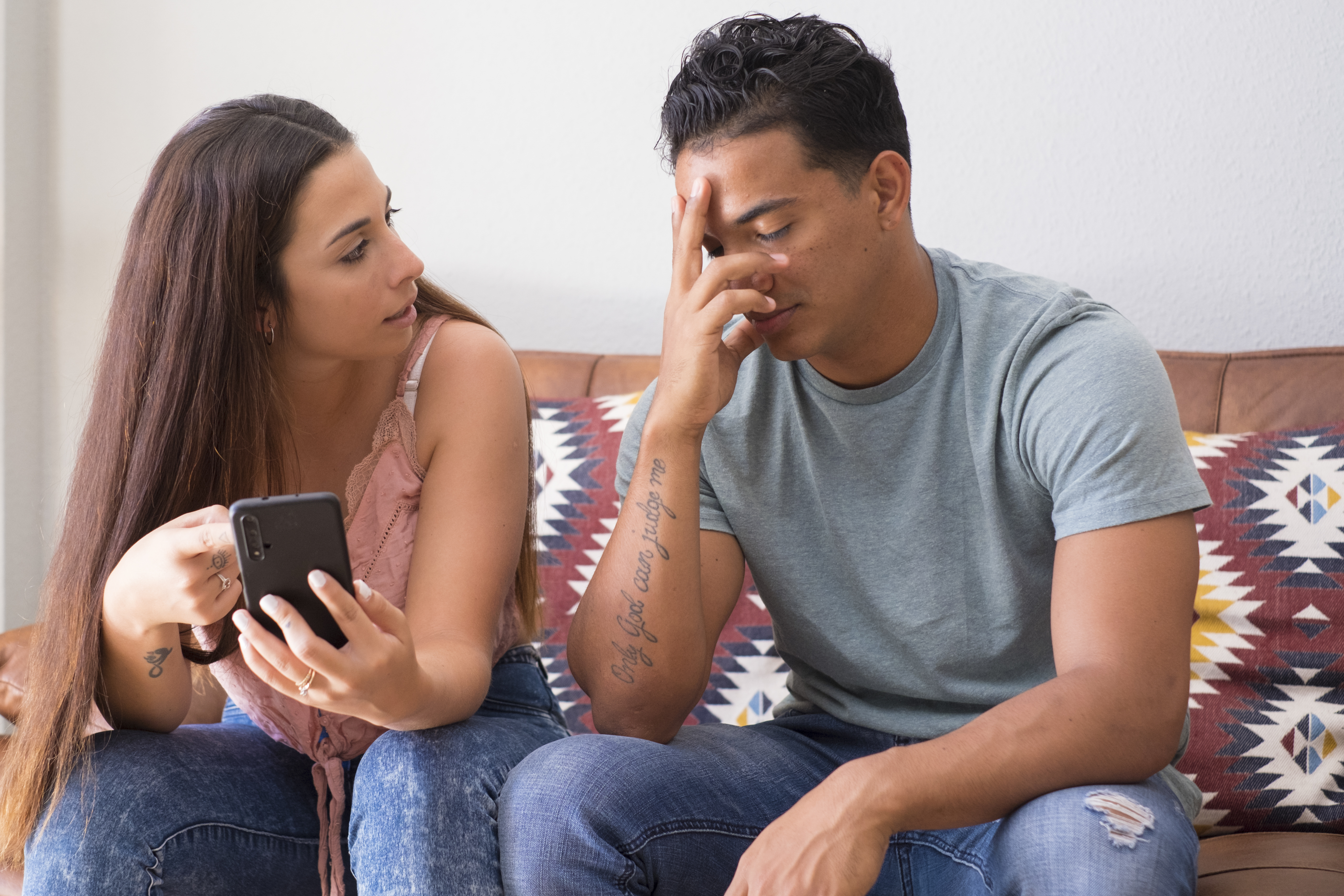Ending a relationship is never easy, it's like ripping off a band-aid: you know it's going to hurt, but doing it carefully can make all the difference. It's an emotional process that can be fraught with self-doubt, sadness, and most of all, guilt. But is it possible to end a relationship without feeling like a monster in the process? The short answer: yes. And here's how.
While, as we said before, it's a painful act, it can also be an act of love and respect, both towards yourself and the other person. The key is how you do it. From how to choose the right words to handling your emotions afterwards, we're looking at ways to help you navigate a breakup with empathy and respect. So, if you feel like it's time to say goodbye, but don't know how, read on.
Why is it so hard for us to end a relationship?
Before we get into the "hows," let's talk about the "why." The difficulty of ending a relationship isn't just emotional; it also has cultural and psychological roots.
- The "eternal love" narrative: From a young age, we're exposed to the idea that true love is forever. Disney movies, romantic comedies, and even classic fairy tales reinforce the notion that if a relationship doesn't last, you've failed. But the reality is that not all relationships are meant to last, and that's okay.
- What will people say: Many people fear how their inner circle will react. "What will my family think if I break up with someone so good?" This fear of judgment can be paralyzing, but remember: no one else lives your life or your emotions.
- Emotional dependency: Long-term relationships can become a pillar in our lives. Saying goodbye means breaking a routine and facing uncertainty. It's like jumping into the void and not knowing what you'll find below.
- Guilt: Feeling responsible for hurting someone is completely normal. We don't want to hurt those we care about, but staying in a relationship for fear of hurting the other person is also unfair.
A good example of this is seen in Marriage Story. The breakup between Scarlett Johansson and Adam Driver's characters reflects the challenge of letting go even when both parties know they're no longer happy together.
How to prepare before the final conversation
Before you approach the breakup face to face, it's important to prepare yourself emotionally to avoid impulsive reactions or misunderstandings.
Reflect on your reasons
Make sure you're completely sure of your decision. Write in a notebook or reflect on questions like:
- What led me to this decision?
- Have I tried to work through the problems beforehand?
- What do I want for my future, and does this relationship fit in with that?
Rehearse what you're going to say
You don't need to memorize a script, but having a clear idea of what you're going to communicate will help you stay focused. Practicing in front of a mirror or with a friend can give you confidence.
Set the stage
Find a quiet time to talk. Don't choose an emotionally charged day (like an anniversary or holiday), and make sure you have enough time to approach the conversation without rushing.
Why do we feel guilty about ending a relationship?
Feeling guilty about breaking up with someone is a common reaction, but where does it come from? In most cases, it's tied to the fear of hurting someone we care about. We want to be honest, but we don't want to be cruel.
On the other hand, society has taught us that breaking up is synonymous with failure. “If it didn't work out, it's because you did something wrong.” Nothing could be further from the truth. Relationships end for many reasons, and that doesn't invalidate them.
Pop culture references illustrate this perfectly. Remember Ross and Rachel on Friends? Their famous line “We were on a break!” shows us that even the most iconic couples face inevitable breakups. The key is in how we handle it.
Here we explain a little more in depth some of the reasons why we feel guilty when we end a relationship:
The fear of being selfish
Many people feel that prioritizing their happiness means neglecting that of their partner. But, in reality, by making the right decision for yourself, you also give the other person the opportunity to find something more compatible with their needs.
Social and family expectations
Some feel that ending a relationship is a betrayal of the effort invested or even the expectations of friends and family. Remember: no one lives your relationship except you and your partner.
Nostalgia and shared memories
It's easy to feel guilty when you remember happy times. But those memories don't invalidate current problems. A relationship may have been good at the time and still not be right for your present.
The power of a difficult conversation: How to say goodbye respectfully
The moment of truth has arrived. You know you need to break up, but how do you do it without it feeling like a scene from a soap opera?
The ideal breakup doesn't exist, but there are ways to do it in a respectful and empathetic way. Here are some key steps:
Choose the right time and place
No, a text message won't do (unless you have no other option). Ending a relationship deserves a face-to-face conversation, in a private, neutral place. Avoid public spaces or times when the other person is especially vulnerable, like their birthday or a stressful day.
Be honest, but empathetic
Empathy doesn't mean watering down the message so much that it becomes confusing. Use clear but kind phrases like:
- “This isn't easy for me, but I feel like we're not growing together anymore.”
- “I value you very much, but I think it's best for both of us to go our separate ways.”
- “This decision isn't easy for me, but I feel like it's the right thing to do.”
Avoid clichés like “It's not you, it's me”—not only do they sound insincere, but they can also leave more questions than answers.
Speak from your perspective
Instead of blaming the other person, focus on your feelings and needs:
- “I've been doing a lot of thinking and I feel like this is the best thing for me right now.”
This minimizes the chance of the conversation turning into an argument or a blame game.
Validate their feelings
Hearing criticism or tears can be difficult, but it's important to allow your partner to process the news in their own way. Avoid defending or justifying yourself too much—remember that this conversation is about closing a chapter, not winning an argument.
Acknowledge their emotions without getting defensive. Use phrases like:
- “I understand that this can be very difficult to hear.”
- “I know you probably weren’t expecting this, but I want to be honest with you.”
Avoid ghosting at all costs
Although it may seem like the easy way out, disappearing without explanation only creates more pain and confusion. Closing the relationship is essential for both parties to move forward.
Key phrases to end the relationship respectfully
- “This isn’t easy for me, but I want to be honest with you.”
- “I feel like we’ve reached a point where our goals are no longer aligned.”
- “I value you very much, but I think we both deserve something different.”
- “It’s better to end now than to prolong something that isn’t working.”
- “I want you to know that I will always be grateful for what we shared.”
How to deal with guilt and other after-effects
Once the conversation is over, guilt and sadness may hit you hard. Did you do the right thing? Could you have tried harder? These are normal questions, but it's important to remember that relationships aren't always meant to last forever.
- Accept that guilt is natural, but not permanent: Guilt, in this case, is a reflection of your empathy. However, you shouldn't let it consume you. Remembering your reasons for ending can help reaffirm your decision.
- Find support in your close circle: Talking to friends or family can be a huge relief. Hearing other perspectives and receiving emotional support will help you deal with your feelings.
- Reflect on what you learned: Every relationship leaves valuable lessons. Take time to think about how you grew thanks to that person and how you can apply that learning in the future.
- Don't look for instant solutions: It's tempting to fill the void immediately, but don't fall into the trap of seeking comfort in another relationship or temporary distractions. Take time to heal and reflect.
- Set post-breakup boundaries: If the other person seeks to staying in touch, consider whether it's healthy for both of you. Sometimes, it's best to take some time away.
Taking Care of Yourself After a Breakup
Self-care is key to getting over a breakup in a healthy way. Here are some ideas for prioritizing your well-being:
Reconnect With Yourself
Remember that hobby you put aside? Now's the time to pick it up again. Whether it's painting, writing, running, or just watching your favorite shows, find something that makes you happy.
Get Exercise
You don't need to become an Olympic athlete, but getting moving can help you release stress and boost your mood. Even a daily walk makes a big difference.
Surround Yourself With Positive People
Spending time with supportive friends and family can help you feel less alone and more understood.
Exercises to Heal Your Heart and Let Go of Guilt
- Therapeutic Writing: Spend 10 minutes a day writing down your thoughts and feelings without a filter. This can be incredibly liberating.
- Rearrange Your Space: Changing your environment can help symbolize a new beginning.
- Regular Exercise: Not only does it improve your physical health, but it also releases endorphins that make you feel better emotionally.
- Explore New Activities: From cooking classes to yoga, finding new passions can be a great distraction.
- Connect With Friends: Don't underestimate the power of a good conversation with someone who understands you.
What if you still have doubts?
It's normal to feel unsure before making a big decision. If you're still not sure about breaking up, here's a helpful exercise:
- Write down a list of pros and cons about the relationship.
- Reflect on how you feel most of the time: are you happy or just comfortable?
Remember: taking time to decide doesn't mean putting things off indefinitely.
Saying goodbye isn't a failure; it's an act of courage and respect for yourself and the other person. Breaking up honestly and empathetically not only helps you heal, but it also shows your integrity.
Remember:
- Be honest, but kind.
- Handle your emotions with patience.
- Take care of yourself and seek support when you need it.
If you've ever been through a breakup, how did you handle it? Share your experience in the comments. Your story could inspire others who are going through the same thing.
With these steps and tools, you're ready to face a breakup with empathy and respect. Because yes, it is possible to break up without guilt and move on with dignity.
How have you dealt with a difficult breakup? Share your experiences and advice in the comments so that more people can find support in difficult times.






Comentarios